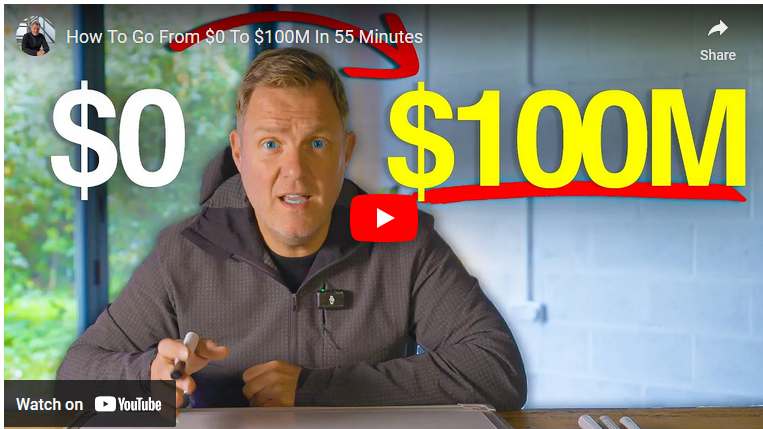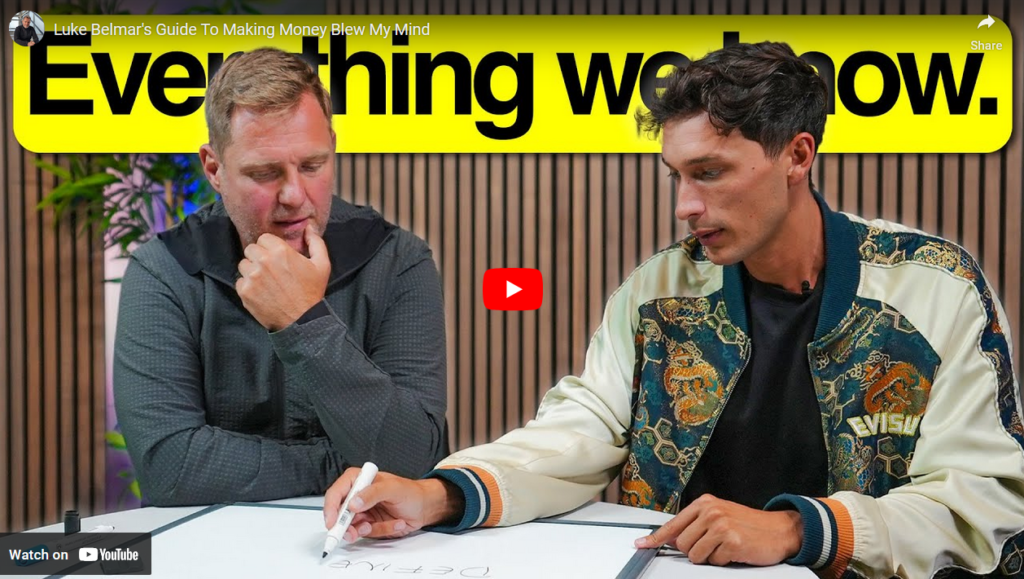SUMMARY:
Mark Randolph, American tech entrepreneur and co-founder of Netflix, discusses his journey from facing a $50 million loss and nearly selling Netflix to Amazon, to pioneering the DVD rental and streaming industry. He emphasizes the importance of mentorship, the reality of entrepreneurship versus its glorified portrayal, and the significance of testing ideas quickly and cheaply. Randolph also shares insights on Netflix’s culture of freedom and responsibility, his personal commitment to work-life balance, and the lessons learned from both successes and failures.
ONE-SENTENCE TAKEAWAY:
Embrace every idea as a potential failure, focus on quick, cheap testing to discover its viability, and prioritize work-life balance to sustain long-term success and personal fulfillment.
IDEAS:
- Every idea initially seems bad; the key is finding a quick, cheap way to test its viability.
- Mentorship is crucial for navigating the entrepreneurial landscape and increasing success odds.
- The glorification of entrepreneurship often overlooks the loneliness and struggles involved.
- Direct response marketing and subscription models were formative in Netflix’s development.
- Creativity involves connecting diverse experiences in new ways to solve problems.
- The internet revolutionized direct marketing, allowing for unprecedented personalization.
- Early experiences in mail order and subscriptions informed Netflix’s innovative approach.
- Netflix’s culture of freedom and responsibility empowers employees to use their judgment.
- Work-life balance is essential for long-term success and personal fulfillment.
- The importance of being adaptable and open to changing direction based on new insights.
- Testing ideas rapidly accelerates learning and helps identify viable opportunities sooner.
- Embracing failure as part of the process can lead to unexpected breakthroughs.
- The transition from DVD rentals to streaming was a pivotal moment in Netflix’s history.
- Strategic partnerships and competition played significant roles in Netflix’s growth.
- The dot-com crash tested Netflix’s resilience and forced strategic reevaluation.
- Personal relationships and commitments outside of work are vital for a balanced life.
- The culture at Netflix challenged conventional business practices, emphasizing trust over rules.
- Continuous improvement and learning from both successes and failures are key entrepreneurial traits.
INSIGHTS:
- Testing ideas quickly and cheaply is more effective than perfecting them in theory.
- A culture that empowers employees through trust and responsibility fosters innovation.
- Work-life balance is not just a personal preference but a strategic business decision.
- Adapting to change and learning from failures are essential skills for entrepreneurs.
- Mentorship can significantly impact an entrepreneur’s journey by providing wisdom and guidance.
- The true measure of success includes personal fulfillment, not just business achievements.
- Creativity in business often comes from connecting seemingly unrelated experiences.
- The internet’s role in transforming business models cannot be overstated, especially for startups.
- Strategic partnerships can be double-edged swords, offering opportunities and challenges.
- Personal commitments, like regular date nights, reinforce the importance of work-life balance.
HABITS:
- Regularly testing new ideas to quickly determine their viability or failure.
- Prioritizing mentorship to give back to the entrepreneurial community.
- Maintaining a work-life balance through scheduled personal time.
- Embracing every idea as potentially bad to avoid attachment and bias.
- Seeking feedback and insights from diverse sources to improve decision-making.
- Continuously learning from both successes and failures for personal growth.
- Cultivating a culture of freedom and responsibility within teams.
- Adapting strategies based on market changes and new learnings.
- Committing to personal relationships as much as professional endeavors.
- Encouraging open communication and honesty within teams.
- Focusing on problem-solving rather than dwelling on obstacles.
- Leveraging past experiences to inform current business strategies.
ACTIONS PLAN:
-
Start Testing Ideas Immediately: Begin by identifying a simple, low-cost method to test your latest business idea. Use online tools or minimal resources to get feedback from potential customers without delay.
-
Implement Work-Life Balance Practices: Schedule regular, non-negotiable time for personal activities or family commitments. Use this time to disconnect from work completely, ensuring you recharge effectively.
-
Cultivate a Culture of Trust: In your team or company, start promoting a culture where employees are trusted to make decisions based on their judgment. Remove unnecessary rules or policies that hinder autonomy.
-
Seek Out Mentorship Opportunities: Look for mentors who have experience in your field or in areas where you seek growth. Offer value in return, such as volunteering your time or sharing your unique skills.
-
Embrace Failure as Learning: When a project or idea fails, conduct a post-mortem analysis to extract valuable lessons. Share these learnings with your team to foster a culture that sees failure as a step towards success.
-
Prioritize Rapid Experimentation: Allocate specific times each week for brainstorming and testing new ideas. Encourage your team to come up with quick experiments that can be executed swiftly.
-
Balance Strategic Planning with Flexibility: While maintaining focus on your long-term vision, stay open to pivoting based on what you learn from testing new ideas or market feedback.
-
Strengthen Personal Relationships: Make a conscious effort to strengthen your relationships outside of work. Plan activities or regular check-ins with loved ones to maintain these connections.
-
Develop a Continuous Improvement Mindset: Regularly review your processes, products, or services for improvement opportunities. Involve your team in this process to encourage their input and engagement.
-
Foster Open Communication: Create an environment where team members feel comfortable sharing their thoughts, feedback, and concerns. Use regular meetings or anonymous surveys to gather insights.
-
Leverage Technology for Efficiency: Identify tools or software that can automate repetitive tasks or streamline processes within your business. This will free up time for more strategic activities.
-
Reflect on Your Entrepreneurial Journey: Set aside time each month to reflect on your progress, challenges faced, and lessons learned. Use this reflection to adjust your goals and strategies accordingly.
CHECKLIST:
| Action Item | Completed |
|---|---|
| Start Testing Ideas Immediately | [ ] |
| Implement Work-Life Balance Practices | [ ] |
| Cultivate a Culture of Trust | [ ] |
| Seek Out Mentorship Opportunities | [ ] |
| Embrace Failure as Learning | [ ] |
| Prioritize Rapid Experimentation | [ ] |
| Balance Strategic Planning with Flexibility | [ ] |
| Strengthen Personal Relationships | [ ] |
| Develop a Continuous Improvement Mindset | [ ] |
| Foster Open Communication | [ ] |
| Leverage Technology for Efficiency | [ ] |
| Reflect on Your Entrepreneurial Journey | [ ] |
QUOTES:
- "Every idea is bad; we just don’t know why they’re bad yet."
- "The important thing is how clever you can be to test it quickly and cheaply."
- "Mentorship is about paying forward the lessons learned over 40 years of entrepreneurship."
- "Entrepreneurship is glorified in a damaging way; it’s actually a very lonely profession."
- "Creativity is collecting lots of different clouds and connecting them in new ways."
- "The internet is direct marketing on steroids."
- "Culture is not aspirational; it’s observational."
- "Work-life balance is not just a personal preference but a strategic business decision."
- "The true measure of success includes personal fulfillment, not just business achievements."
- "If you’re not failing, you’re not pushing your limits."
REFERENCES:
- Mark Randolph’s book: "That Will Never Work: The Birth of Netflix and the Amazing Life of an Idea."
- Direct response marketing techniques used by Randolph in his early career.
- Subscription model innovations introduced by Netflix under Randolph’s leadership.
- The culture deck of Netflix focusing on freedom and responsibility.
- Outdoor activities that Randolph engages in for personal fulfillment.
FACTS:
- Netflix was founded in August 1997 by Mark Randolph and Reed Hastings.
- The company faced a $50 million loss early in its history.
- Netflix initially struggled with the DVD rental model before finding success with subscriptions.
- The dot-com crash in 2000 nearly bankrupted Netflix.
- Blockbuster declined an offer to buy Netflix for $50 million.
- Netflix’s culture emphasizes freedom and responsibility over strict policies.
- Randolph prioritizes work-life balance through scheduled personal time.
- Netflix went public in May 2002, significantly changing Randolph’s life.
- Blockbuster went bankrupt in 2010 after failing to adapt its business model effectively.
- Randolph has been involved in numerous startups throughout his career.
RECOMMENDATIONS:
- Test new business ideas quickly and cheaply before fully committing resources.
- Prioritize work-life balance to maintain long-term productivity and happiness.
- Cultivate a culture of trust within your organization to empower employees.
- Seek mentorship from experienced entrepreneurs to navigate challenges more effectively.
- Embrace failure as an opportunity for learning and growth.
- Encourage rapid experimentation within your team to foster innovation.
- Remain flexible in your strategic planning to adapt to new insights and market feedback.
- Strengthen personal relationships outside of work for a fulfilling life.
- Develop a continuous improvement mindset for both personal and professional growth.
- Foster open communication within your team for better collaboration and problem-solving.
- Leverage technology to improve efficiency and free up time for strategic thinking.
- Regularly reflect on your entrepreneurial journey to adjust goals and strategies as needed.


